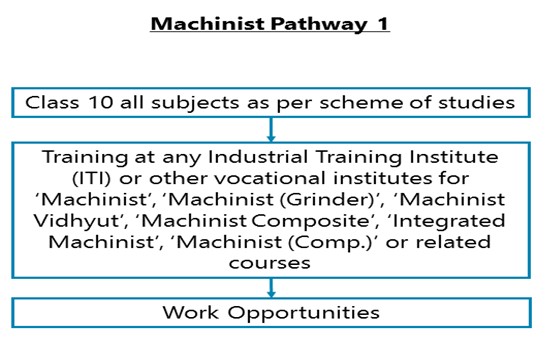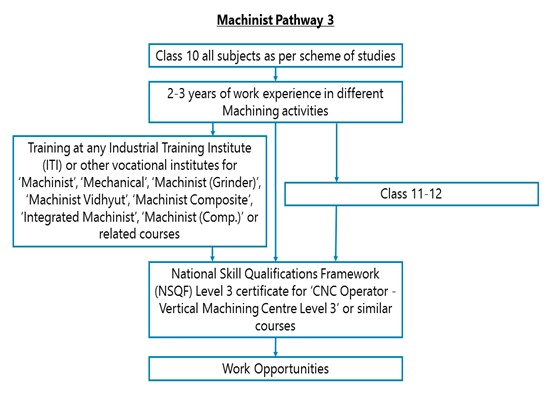Machinist
Entry Level Qualification
10
Career Fields
Mechanic & Technician
For Specially Abled






Career Entrance Exam
About Career
As a Machinist, you will use different types of machines and machine tools such as lathe machines, grinding machines, broaching machines, milling machine, shaper, planer, and hobbing machines for cutting, grinding, shaping or otherwise modify metal sheets or metal parts. These metal sheets or parts are then used to manufacture various parts of engineering machinery or products made of metal. These parts are used for construction and assembly of various engineering products such as a power generator, car engine, and a packaging machine.
You will either use various manually operated machines and tools such as a lathe machine but many of the machines and tools used today for machining (for cutting, grinding, shaping or otherwise modify metal sheets or metal parts) are controlled by CNC machining systems and processes. In CNC (Computer Numerical Control) machining, various machines and machine tools are controlled by computer software.
Key Roles and Responsibilities:
As a Machinist, you will be engaged with one or more of the following roles and responsibilities:
1. Studying engineering drawings or measure sample parts with appropriate measuring instruments to note different dimensions, specifications and the sequence of machining operations required to cut, grind, shape or otherwise modify metal sheets or metal parts.
2.Doing the process planning for the machining operations as per engineering drawings, the sequence of operations and other specifications.
3. Selecting metal pieces and mark them for machining operations required as per engineering drawings or measurements.
4. Fixing or fastening metal pieces on the appropriate machine used for the machining process.
5. Setting the machines for different machining operations as per the engineering drawings and specifications.
6. If using CNC (Computer Numeric Control) machining systems, setting various machining parameters in the computer software as per engineering drawings and specifications.
7.Operating machines and various tools manually or if using CNC systems, observe the process progression using CNC control panels.
8.Observing the machining process and also check whether the metal parts are being cut, ground, shaped or modified as per the engineering drawings and other specifications.
9.Making adjustments to the machining operations or in the CNC systems to ensure that the machining is being done as per requirements.
PARTICULARS | DESCRIPTION |
Name | Machinist |
Purpose | Operates and Maintains Lathe and Milling Machines |
Career Field | Mechanic & Technician |
Required Entrance Exam | No Entrance Exam |
Average Salary | 1,00,000 - 2,00,000 Rs. Per Year |
Companies For You | Automobile, Iron and Steel, Construction & Many More |
Who is Eligible | Class 10th Pass |
Career Entry Pathway
Class 10 all subjects as per scheme of studies – training at an ITI or similar institutefor ‘Machinist’ or related courses
After Class 10, you can go for training at any Industrial Training Institute (ITI), National Skill Training Institute (NSTI), Regional Vocational Training Institute (RVTI), National Vocational Training Institute (NVTI), Industrial Training Center (ITC), Workshop Training Institute (WTI) or other vocational institutes for ‘Machinist’, ‘Machinist (Grinder)’, ‘Machinist Vidhyut’, ‘Machinist Composite’, ‘Integrated Machinist’, ‘Machinist (Comp.)’ or related courses. You will sit for All India Trade Test (AITT) to get a National Trade Certificate (NTC) after this course. This exam is held twice a year in the months of February and July.
Class 10 all subjects as per scheme of studies – NSQF Level 5 CTS Training in ‘Machinist’ or related courses
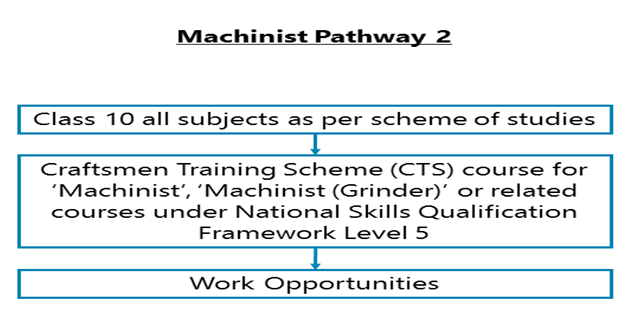
After Class 10, you can go for Craftsmen Training Scheme (CTS) course for ‘Machinist’, ‘Machinist (Grinder)’ or related courses under National Skills Qualification Framework Level 5. This is a 2-year course with 4 semesters of 6 months each.
Class 10 all subjects as per scheme of studies –NSQF Level 3 Certificate for ‘CNC Operator - Vertical Machining Centre Level 3’ or similar courses
After Class 10, you can pursue National Skill Qualifications Framework (NSQF) Level 3 certificate for ‘CNC Operator - Vertical Machining CentreLevel 3’ or similar courses after 2-3 years of work experience in different Machining activities. The total number of training hours is 400. You can also join the NSQF course directly after Class 11-12 or after vocational training at an ITI or similar institute for ‘Machinist’, ‘Mechanical’ or related courses.
Class 10 all subjects as per scheme of studies– training at an ITI or similar institute for ‘Machinist’ or related courses- NSQF Level 4 certificate for ‘Machining Technician Level 4’ or similar courses
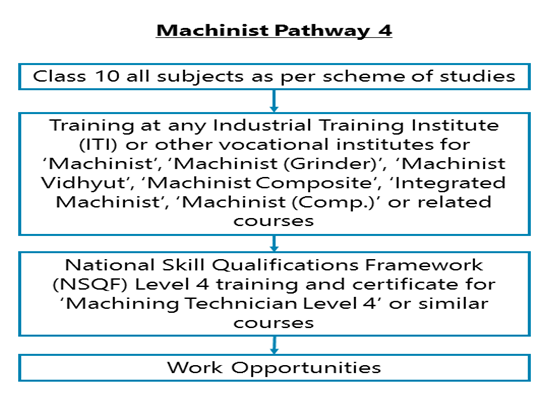
After Class 10, you can go for training at any Industrial Training Institute (ITI), National Skill Training Institute (NSTI), Regional Vocational Training Institute (RVTI), National Vocational Training Institute (NVTI), Industrial Training Center (ITC), Workshop Training Institute (WTI) or other vocational institutes for ‘Machinist’, ‘Machinist (Grinder)’, ‘Machinist Vidhyut’, ‘Machinist Composite’, ‘Integrated Machinist’, ‘Machinist (Comp.)’ or related courses. You will sit for All India Trade Test (AITT) to get a National Trade Certificate (NTC) after this course. This exam is held twice a year in the months of February and July. Then pursue National Skill Qualifications Framework (NSQF) Level 4 training and certificate for ‘Machining Technician Level 4’ or similar courses. The total number of training hours is 400.
Class 10 all subjects as per scheme of studies – training at an ITI or similar institute for ‘Machinist’ or related courses- pursue National Skill Qualifications Framework (NSQF) Level 4 certificate for ‘Mining Machinist’or similar courses
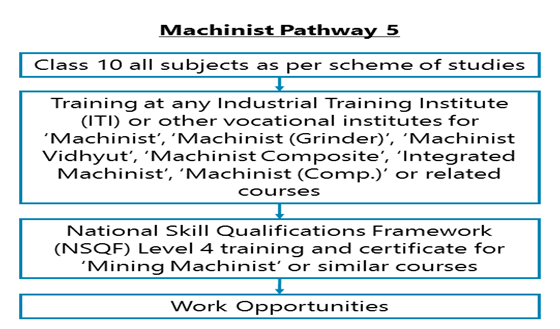
After Class 10, you can go for training at any Industrial Training Institute (ITI), National Skill Training Institute (NSTI), Regional Vocational Training Institute (RVTI), National Vocational Training Institute (NVTI), Industrial Training Center (ITC), Workshop Training Institute (WTI) or other vocational institutes for ‘Machinist’, ‘Machinist (Grinder)’, ‘Machinist Vidhyut’, ‘Machinist Composite’, ‘Integrated Machinist’, ‘Machinist (Comp.)’ or related courses. You will sit for All India Trade Test (AITT) to get a National Trade Certificate (NTC) after this course. This exam is held twice a year in the months of February and July. Then pursue National Skill Qualifications Framework (NSQF) Level 4 training and certificate for ‘Mining Machinist’ or similar courses. The total number of training hours is 210.
Class 10 all subjects as per scheme of studies – training at an ITI or similar institute for ‘Machinist’ or related courses - pursue National Skill Qualifications Framework (NSQF) Level 4 certificate for ‘AC/LAC: Work Shop Fitter (Machinist)’ or similar courses
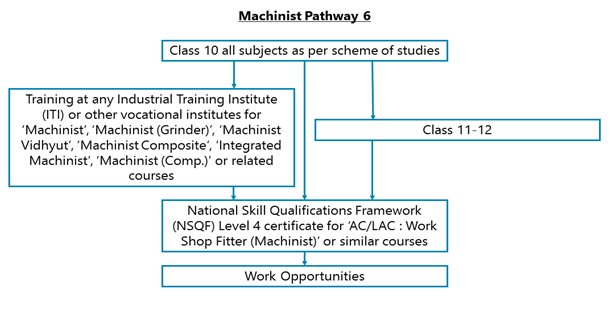
After Class 10, you can go for training at any Industrial Training Institute (ITI), National Skill Training Institute (NSTI), Regional Vocational Training Institute (RVTI), National Vocational Training Institute (NVTI), Industrial Training Center (ITC), Workshop Training Institute (WTI) or other vocational institutes for ‘Machinist’, ‘Machinist (Grinder)’, ‘Machinist Vidhyut’, ‘Machinist Composite’, ‘Integrated Machinist’, ‘Machinist (Comp.)’ or related courses. You will sit for All India Trade Test (AITT) to get a National Trade Certificate (NTC) after this course. This exam is held twice a year in the months of February and July. Then pursue National Skill Qualifications Framework (NSQF) Level 4 certificate for ‘AC/LAC: Work Shop Fitter (Machinist)’ or similar courses. The total number of training hours is 4140. Your age should be between 17-21 years for this training. You can also join the NSQF course directly after class 10 (with 60% marks in aggregate and 50% marks in English) or after Class 11-12.
Class 10 all subjects as per scheme of studies – training at an ITI or similar institute for ‘Machinist’ or related courses - obtain National Apprenticeship Certificate
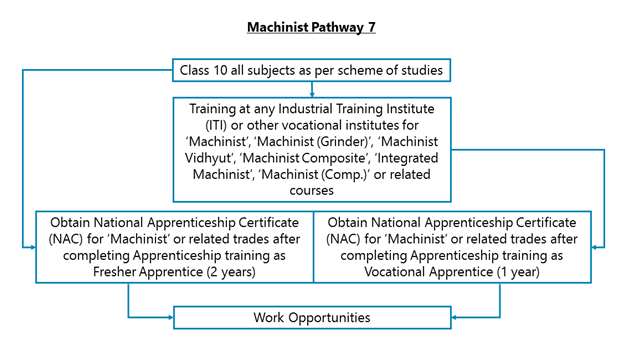
After Class 10, you can go for training at any Industrial Training Institute (ITI), National Skill Training Institute (NSTI), Regional Vocational Training Institute (RVTI), National Vocational Training Institute (NVTI), Industrial Training Center (ITC), Workshop Training Institute (WTI) or other vocational institutes for ‘Machinist’, ‘Machinist (Grinder)’, ‘Machinist Vidhyut’, ‘Machinist Composite’, ‘Integrated Machinist’, ‘Machinist (Comp.)’ or related courses. You will sit for All India Trade Test (AITT) to get a National Trade Certificate (NTC) after this course. This exam is held twice a year in the months of February and July. Then you can obtain National Apprenticeship Certificate (NAC) for ‘Machinist’ or related trades after completing Apprenticeship training. You can join the Apprenticeship program after passing Class 10 also. Apprenticeship training is of the following durations. After you complete: Class 10 with any subjects, Science and Mathematics (as a Fresher apprentice): 2 years of Basic training (6 months) and Practical training (18 months) , ITI course (as Vocational Apprentice): Only Practical training (12 months).
Required Qualification & Competencies
After class 10, you can go for:
1. ITI Training courses.
2. NSQF Training courses.
3. CTS (Craftsmanship Training Scheme of Government of India)courses.
4. National Apprenticeship Certificate (NAC) after ITI or Class 10
Various private/public vocational training establishments across India offer these or similar courses on:
1. Machinist
2. Machinist (Grinder)
3. Agricultural and Farm Machinery
4. Farm Machinery & Power Engineering
5. Machine Design
6. Mechanic Mining Machinery
7. Advanced Machine Tool Maintenance
8. Maintenance Mechanic for Leather Machinery
9. Mechanic (Agriculture Machinery)
10. Mechanic (Earth Moving Machinery)
11. Mechanic Advanced Machine Tool Maintenance
12. Mechanic Agricultural Machinery
13. Mechanic Machine Tool Maintenance
14. Mechanic Maintenance (Textile Machinery)
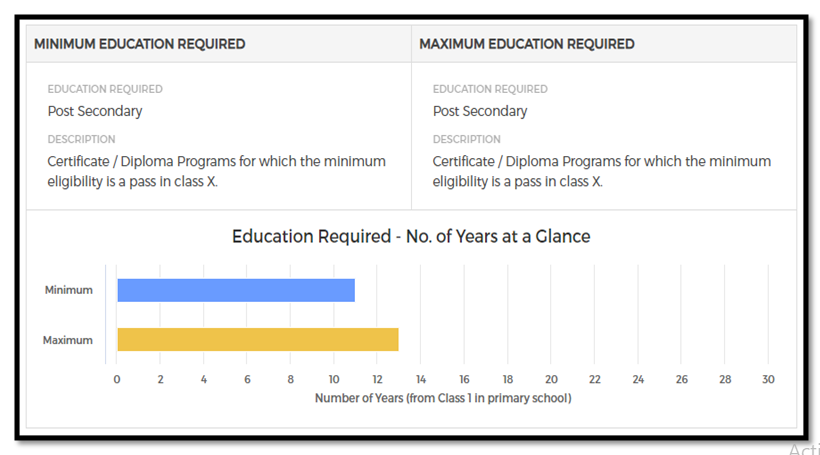
Competencies Required
1. You should have interests for Realistic Occupations. Realistic occupations involve more practical and hands-on activities than paperwork or office work. Realistic occupations often involve physical activities for getting things done using various tools and equipment.
2. You should have interests for Conventional Occupations. Conventional occupations involve repetitive and routine tasks as well as fixed processes or procedures for getting things done. These occupations involve working more with data, systems, and procedures and less with ideas or creativity.
3. You should have interests for Investigative Occupations. Investigative occupations involve working with ideas and quite a lot of thinking, often abstract or conceptual thinking. These involve learning about facts and figures; involve the use of data analysis, assessment of situations, decision making and problem-solving.
4. You should have knowledge of Mechanical Engineering & Technology - Knowledge of Mechanical Engineering & Technologies which include design, development, testing, manufacturing, installation, operations, repair and maintenance of different machinery, devices, equipment,and tools.
5. You should have Machine Repair and Maintenance Skills - performing repair and maintenance of different machines, equipment, and devices.
6. You should have Problem Solving Skills - analysis and understanding of problems, evaluating various options to solve the problems and using the best option to solve the problems.
7. You should have Arm-Hand Steadiness - The ability to keep your hand and arm steady while moving your arm or while holding your arm and hand in one position.
8. You should have Manual Dexterity - The ability to quickly move your hand, your hand together with your arm, or your two hands to grasp, manipulate, or assemble objects.
9. You are always or mostly careful about your actions and behavior.
10. You are practical always or in most situations.
11. You are always or mostly disciplined in your action and behavior.
12. You are always or mostly organized in your day-to-day life and activities.
Career - Job Opportunities & Profiles
You will get job roles like Junior Machinist, Assistant Machinist, CNC Machinist, ITI Machinist, Lathe Operator, Apprentice Machinist, Semi-skilled Operator, Machining Technician etc.
Some of the industries that will require your services are:
1. Industrial Products / Heavy Machinery
2. Automobile / Auto Anciliary / Auto Components
3. Oil and Gas / Energy / Power / Infrastructure
4. Construction / Engineering / Cement / Metals
5. Railways
6. Government / Defence
7. Iron and Steel
8. Water Treatment / Waste Management
Specialisation Tracks In This Career
1. CNC (Computer Numerical Control) Operator/ Machining Technician
CNC Operator/ Machining Technicians generally perform basic operations like inspecting machine parts and replacing worn-out (old) or defective parts. They usually use computers to control and operate machine tools. They need to understand engineering drawings and plan their work accordingly.
2. Automotive Machinist
Automotive Machinists work in the automotive (vehicles) industry. They set up, repair, service and maintain various types of car parts, engine components, etc. They need to collaborate regularly with welders and engineers.
3. Mine Machinist
Mine Machinists look after the machining activities in the mines. They cut, shape and finish metal to make machine parts and components according to documents given to them by engineers or project advisors. They use computer-controlled metal cutting machines and another hand/special tools during work.
4. Work Shop Machinist (Defense)
Work Shop Machinists (Defense) work in factories dealing with the production of equipment and machines required in the defense industry. They carry out major building, replacement and repair jobs for aero-enginecomponents (for aircraft), ground equipment, military motor transport etc.
Career Growth
From entry-level job positions as a Machine Operator, Junior Machinist, Apprentice Machinist, Assistant Machinist etc you will grow up to roles like Corporal, Sergeant (Sgt), Junior Warrant Officer (JWO) (through departmental exams like Corporal Promotion Exams, Sergeant Promotion Exams and Junior Warrant Promotion Exams); Senior Technician (Machinist); Machinist Supervisor; Master Machining Technician; Chief Machinist etc.
Salary Offered
1. Salaries vary according to job profiles and the kind of facilities you get to work at.
2. In the entry-level jobs: You may expect between Rs. 8000 –14,000 per month.
3. Salaries increase with your work experience and as you get promoted.
4. In the mid-level jobs, with 6-12 years of work experience, you may expect between Rs.13,000 – 40,000 per month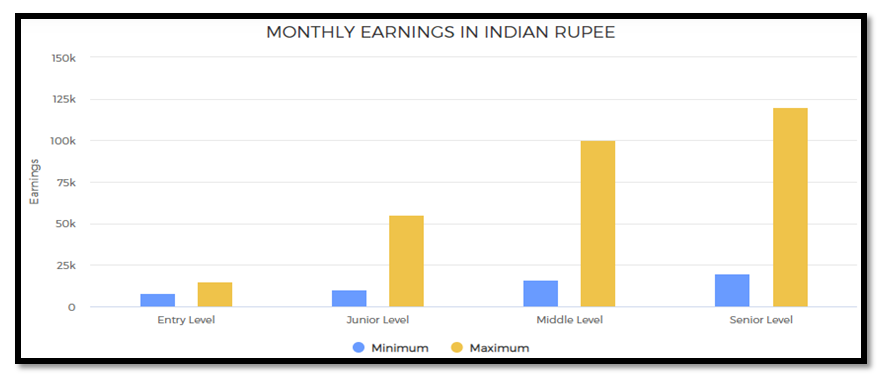
Monthly Earnings In Indian Rupee

1. Entry level: 0 - 2 years of work experience
2. Junior Level: From 1 to 12 years of work experience
3. Mid Level: From 5 to 20+ years of work experience
4. Senior Level: From 10 to 25+ years of work experience (there could be exceptions in some high-end technical, financial, engineering, creative, management, sports, and other careers; also in the near future, people will reach these levels much faster in many careers and in some careers, these levels will have no meaning as those careers will be completely tech skill driven such as even now, there is almost no level in a Cyber Security Expert’s job)
Work Activities
1. Operating machines, equipment, devices, systems and processes - Using various methods and techniques to operate machines, equipment, devices, systems,and processes in industrial and other settings.
2. Installing, repairing and maintaining equipment, devices, and products - Installing, servicing, repairing, and maintaining equipment, devices, and products for usages in homes, workplaces, and industrial settings.
3. Getting Information and learning - Observing, hearing, reading, using computers, or otherwise obtaining information and learning from it.
4. Inspecting equipment, systems, structures, and materials - Inspecting equipment, systems, structures, and materials to ascertain quality, performance, defects, causes of errors, etc.
5. Performing physical activities - Performing physical activities that require the use of your arms and legs and moving your whole body, such as climbing, lifting, balancing, walking, stooping, and handling of materials.
6. Handling and moving objects and materials - Using hands or otherwise use physical strength to handle and move objects and materials; maneuver, install, lift, place, manipulate, etc.
7. Communicating with co-workers and others - Communicating with people in writing, verbally or otherwise inside your workplace and various other people who have professional relationships with your place of work including vendors, government officials, etc. or with people at large.
8. Communicating with customers - Communicating with potential and existing customers of your organization in writing, verbally or otherwise.
9. Providing advice and consultation to others - Giving advice or consultation to others about various issues, conceptual matters, know-hows, scientific matters, products or services.
Future Prospects
The future for this pathway seems to show decent growth. Skilled Machinists will be required to fill in the skill gaps as the following trends are expected in the near future in the Indian Economy. The capital goods industry turnover is forecasted to reach the mark of 115.17 billion US Dollars Electrical equipment market production is expected to reach 100 billion US Dollars mark. Engineering Research and Design revenues are forecasted to reach 42 billion US Dollars. Construction equipment market is expected to touch 7 billion US Dollars mark. The contribution of Indian Automotive Components and OEM (Original Equipment Manufacturer) Industry to the global turnover is expected to double. Vehicle sales are also expected to triple.

Future Prospects At A Glance


